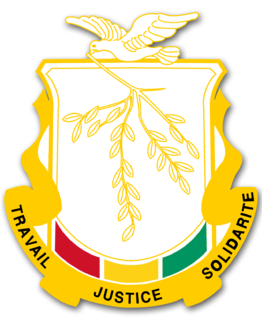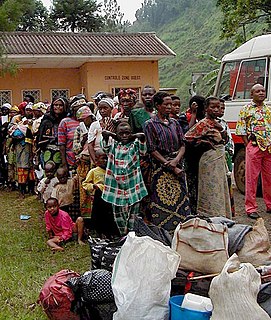
A referendum was expected to take place in the United Kingdom in 2006 to decide whether the country should ratify the proposed Treaty establishing a Constitution for Europe. However, following the rejection of the Constitution by similar referendums in France in May 2005 and the Netherlands in June 2005, the UK vote was postponed indefinitely. The question was rendered moot when the constitution was superseded by the Treaty of Lisbon, which Parliament ratified in 2008 without holding a referendum.

This is a list of referendums related to the European Union, or referendums related to the European Communities, which were predecessors of the European Union. Since 1972, a total of 48 referendums have been held by EU member states, candidate states, and their territories, with several additional referendums held in countries outside of the EU. The referendums have been held most commonly on the subject of whether to become a member of European Union as part of the accession process, although the EU does not require any candidate country to hold a referendum to approve membership or as part of treaty ratification. Other EU-related referendums have been held on the adoption of the euro and on participation in other EU-related policies.

A referendum on the treaty establishing a Constitution for Europe was held in Spain on 20 February 2005. The consultative referendum on ratification of the proposed Constitution of the European Union was approved by 81.8% of voters, although turnout was just 41.8%, the lowest since the end of the Franco era.

A consultative referendum on the Treaty establishing a Constitution for Europe was held in the Netherlands on 1 June 2005 to decide whether the government should ratify the proposed Constitution of the European Union. The result was a "No"-vote.

The electorate of Iraq went to the polls on 15 October 2005 to vote in a referendum on whether or not to ratify the proposed constitution of Iraq. After 10 days of counting votes, the country's electoral commission announced that the constitution had been approved by a wide margin nationwide. A number of critics allege massive irregularities, especially in the crucial province of Ninawa, which was widely expected to provide the third "no" vote.

A constitutional referendum was held in Bolivia on 25 January 2009, postponed from the initially planned dates of 4 May 2008 and then 7 December 2008. Drafted by the Constituent Assembly in 2007, the new constitution was approved in the referendum according to an exit poll by Ipsos Apoyo for La Razón and ATB, a Bolivian television network. Furthermore, it required early elections to be held on 6 December 2009.

A constitutional referendum was held in Kyrgyzstan on 21 October 2007, following the constitutional crisis caused by amendments passed since the Tulip Revolution in 2005 being invalidated by the Constitutional Court of Kyrgyzstan on 14 September 2007. Voters were asked whether questions on a new constitution and electoral law. Both were approved by over 95% of voters.
Five referendums were held in Switzerland during 2005. The first two were held on 5 June on Switzerland joining the Schengen Area and whether registered partnerships for same-sex couples should be introduced. Both questions were approved. The third was held on 25 September on a federal resolution on extending the agreement on free movement of people to new members of the European Union, and was also approved. The final two were held on 27 November on a popular initiative "for food from an agriculture free of genetic modification" and on a labour law related to the opening times of shops in public transport hubs. Both were approved.

The 2005 Egyptian constitutional referendum took place in Egypt on 25 May 2005. The referendum was on a proposed change to the constitution of Egypt which would establish direct elections for the presidency. The opposition parties called for a boycott of the vote, which was passed by a large majority.

A constitutional referendum was held in the Republic of the Congo on 20 January 2002, with results showed over 87% voted in favour with a voter turnout of 77.5%.

Presidential elections were held in the Democratic Republic of the Congo on 1 November 1970. The only candidate was Joseph Mobutu, who had taken power in a military coup five years earlier. The elections took the format of a "yes" or "no" vote for Mobutu's candidacy, with the results showing he won more "yes" votes than the number of registered voters, even though voting was not compulsory.

A referendum on the new Constitution of France was held in Moyen-Congo on 28 September 1958 as part of a wider referendum held across the French Union. The new constitution would make the territory an autonomous republic within the French Community, and was approved by 99% of voters. The Territorial Assembly proclaimed the Republic of the Congo on 28 November 1958, and the country became independent two years later.

A constitutional referendum regarding the Prince’s powers was held in Liechtenstein on 14 March 2003. The referendum had two questions; a "Princely Initiative" and a "Constitution Peace Initiative". The first question passed with 64.32% in favour and the second question was rejected by 83.44% of voters.
A referendum on constitutional reforms was held in Morocco on 1 July 2011. It was called in response to a series of protests across Morocco that began on 20 February 2011 when over ten thousand Moroccans participated in demonstrations demanding democratic reforms. A commission was to draft proposals by June 2011. A draft released on 17 June foresaw the following changes:

A constitutional referendum was held in Egypt in two rounds on 15 and 22 December 2012. Egyptians living abroad were scheduled to vote between 8 and 11 December. Voting for expatriates had been delayed until 12 December 2012 and was extended until 17 December 2012. Voters were asked whether they approve of the draft constitution that was approved by the Constituent Assembly on 30 November 2012.

A series of referendums on the proposed constitution of Australia were held between 2 June 1898 and 31 July 1900 in the six colonies that were to become the states of the Commonwealth of Australia. The first four referendums were held in New South Wales, South Australia, Tasmania and Victoria in June 1898. Although all four saw a majority vote in favour, the majority in New South Wales was insufficient. Knowledge of the result in New South Wales led to low voter turnout in South Australia.
A referendum is a direct vote in which an entire electorate is asked to either accept or reject a particular proposal. This article summarises referendum laws and practice in various countries.

A constitutional referendum was held in the Republic of the Congo on 25 October 2015 regarding a proposal to change the constitution, primarily to modify the rules regarding presidential terms.

Guinea has had four constitutions. The current constitution was approved by referendum on 19 April 2010 and formally adopted on 7 May.


















